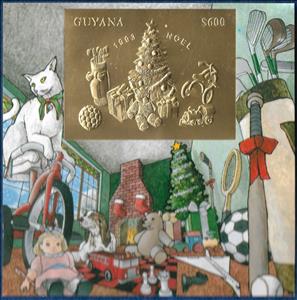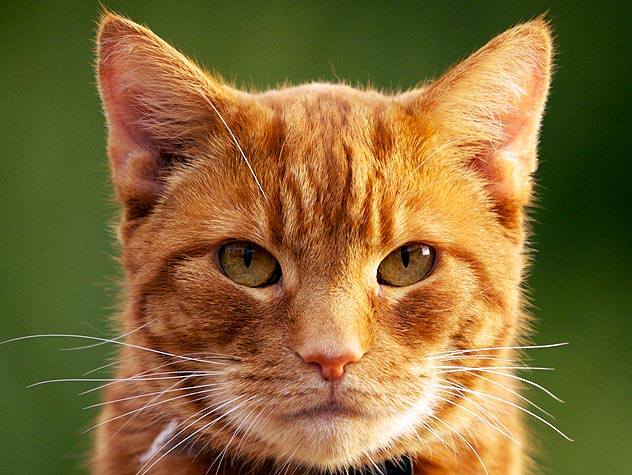Souvenir Sheet: Christmas Tree and Gifts (Guyana 1993)
Christmas Tree and Gifts (Guyana 1993)
11 October (Guyana ) within release Christmas 1993 (Metal) goes into circulation Souvenir Sheet Christmas Tree and Gifts face value 600 Guyanese dollar
| Souvenir Sheet Christmas Tree and Gifts in catalogues | |
|---|---|
| Michel: | Mi: GY BL351 |
| Colnect codes: | Col: GY 1993.10.11-31 |
Souvenir Sheet is vertical format.
Also in the issue Christmas 1993 (Metal):
- Souvenir Sheet - Children Build Snowman face value 600;
- Souvenir Sheet - Children Build Snowman face value 600;
- Stamp - Christmas tree face value 600;
- Souvenir Sheet - Christmas Tree and Gifts face value 600;
- Souvenir Sheet - Christmas Tree and Gifts face value 600;
- Souvenir Sheet - Christmas Tree and Gifts face value 600;
- Souvenir Sheet - Christmas Tree and Gifts face value 600;
- Stamp - Toys, Snowman, Sleigh face value 600;
Souvenir Sheet Christmas Tree and Gifts it reflects the thematic directions:
Animals are multicellular, eukaryotic organisms of the kingdom Animalia (also called Metazoa). All animals are motile, meaning they can move spontaneously and independently, at some point in their lives. Their body plan eventually becomes fixed as they develop, although some undergo a process of metamorphosis later on in their lives. All animals are heterotrophs: they must ingest other organisms or their products for sustenance.
The domestic cat (Latin: Felis catus) is a small, typically furry, carnivorous mammal. They are often called house cats when kept as indoor pets or simply cats when there is no need to distinguish them from other felids and felines. Cats are often valued by humans for companionship and for their ability to hunt vermin. There are more than 70 cat breeds, though different associations proclaim different numbers according to their standards.
Cats are similar in anatomy to the other felids, with a strong flexible body, quick reflexes, sharp retractable claws, and teeth adapted to killing small prey. Cat senses fit a crepuscular and predatory ecological niche. Cats can hear sounds too faint or too high in frequency for human ears, such as those made by mice and other small animals. They can see in near darkness. Like most other mammals, cats have poorer color vision and a better sense of smell than humans. Cats, despite being solitary hunters, are a social species and cat communication includes the use of a variety of vocalizations (mewing, purring, trilling, hissing, growling, and grunting), as well as cat pheromones and types of cat-specific body language.
Christmas or Christmas Day (Old English: Crīstesmæsse, meaning "Christ's Mass") is an annual festival commemorating the birth of Jesus Christ, observed most commonly on December 25 as a religious and cultural celebration among billions of people around the world. A feast central to the Christian liturgical year, it is prepared for by the season of Advent or the Nativity Fast and initiates the season of Christmastide, which historically in the West lasts twelve days and culminates on Twelfth Night; in some traditions, Christmastide includes an Octave. The traditional Christmas narrative, the Nativity of Jesus, delineated in the New Testament says that Jesus was born in Bethlehem, in accordance with messianic prophecies; when Joseph and Mary arrived in the city, the inn had no room and so they were offered a stable where the Christ Child was soon born, with angels proclaiming this news to shepherds who then disseminated the message furthermore. Christmas Day is a public holiday in many of the world's nations, is celebrated religiously by the vast majority of Christians, as well as culturally by a number of non-Christian people, and is an integral part of the holiday season, while some Christian groups reject the celebration. In several countries, celebrating Christmas Eve on December 24 has the main focus rather than December 25, with gift-giving and sharing a traditional meal with the family.
The domestic dog (Canis lupus familiaris or Canis familiaris) is a member of genus Canis (canines) that forms part of the wolf-like canids, and is the most widely abundant carnivore. The dog and the extant gray wolf are sister taxa, with modern wolves not closely related to the wolves that were first domesticated. The dog was the first domesticated species and has been selectively bred over millennia for various behaviors, sensory capabilities, and physical attributes. Their long association with humans has led dogs to be uniquely attuned to human behavior and they are able to thrive on a starch-rich diet that would be inadequate for other canid species. Dogs vary widely in shape, size and colours. Dogs perform many roles for people, such as hunting, herding, pulling loads, protection, assisting police and military, companionship and, more recently, aiding handicapped individuals. This influence on human society has given them the sobriquet "man's best friend".
A gift or a present is an item given to someone, without the expectation of payment or anything in return. An item is not a gift if that item is already owned by the one to whom it is given. Although gift-giving might involve an expectation of reciprocity, a gift is meant to be free. In many countries, the act of mutually exchanging money, goods, etc. may sustain social relationship and contribute to social cohesion. Economists have elaborated the economics of gift-giving into the notion of a gift economy. By extension, the term gift can refer to any item or act of service that makes the other happier or less sad, especially as a favour, including forgiveness and kindness. Gifts are often presented on occasions such as birthdays and holidays.
A teddy bear is a stuffed toy in the form of a bear. Developed apparently simultaneously by toymakers Morris Michtom in the U.S. and Richard Steiff under his aunt Margarete Steiff's company in Germany in the early 20th century, the teddy bear, named after President Theodore Roosevelt, became a popular children's toy and has been celebrated in story, song, and film






